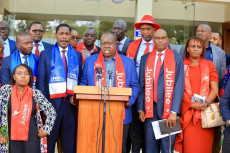- It may be time for Kenyans to reflect on how they engage with their leaders. The cycle of idolizing and condemning presidents only deepens national divisions and stifles progress. Instead, there’s value in embracing change and recognizing the potential for new approaches to governance.
The political journey in Kenya is a captivating and unpredictable narrative. In recent times, Kenyan politics have unfolded a story of admiration, rejection, and eventually nostalgia. At the core of this ever-changing narrative is the country's tendency to oscillate between adoring and criticizing its leaders. The latest figure caught in this pendulum swing is President William Ruto, who has transitioned from being hailed as a people's champion to facing widespread scepticism.
Just a year ago, Ruto was hailed as a symbol of change—a man who defied the odds to become president. Today, however, the enthusiasm has faded, replaced by growing frustration. This isn't new. Former President Uhuru Kenyatta, in his second term as the president, faced a similar arc, but later embraced as a misunderstood statesman.
Why does this keep happening? It reflects something deeper about Kenya's political psyche. For decades, the country has been ruled by an elite class groomed by colonial powers to lead. However, in 2022, William Ruto painted a picture of a self-made politician from humble beginnings, which was bought mainly by Kenyans to end "dynasties" rule. While his rise inspired hope, it also disrupted a long-standing system, leaving many Kenyans unsure how to relate to him.
Adding to this uncertainty is Ruto's leadership style. Unlike his predecessors, who relied on force and dominance, Ruto approached governance with strategy and adaptability. He's more of a fox than a lion, preferring calculated moves and diplomacy over sheer power and aggression. This unfamiliar approach has left many Kenyans grappling to understand his methods.
Consider his decision to cancel the controversial Adani deal. On the surface, it seemed like he bowed to public pressure. But to those paying attention, it appeared to be a clever move to disarm critics and neutralize protests. By removing a central grievance, Ruto left his opponents scrambling for a new narrative, demonstrating his knack for staying ahead of the game.
Read More
This shift in leadership has also highlighted regional and ethnic dynamics. The Kikuyu community, for example, has traditionally been at the centre of Kenyan politics. Their strong desire for dominance often leads to distrust of any government that doesn't revolve around their influence. With Ruto's presidency, they find themselves in unfamiliar territory, fueling further tensions.
It may be time for Kenyans to reflect on how they engage with their leaders. The cycle of idolizing and condemning presidents only deepens national divisions and stifles progress. Instead, there's value in embracing change and recognizing the potential for new approaches to governance.
Kenya's political story is still evolving. The ongoing push-and-pull between leaders and citizens presents an opportunity to break old patterns and build a more united future. Whether the nation seizes this chance depends on its willingness to adapt and move beyond the past.







